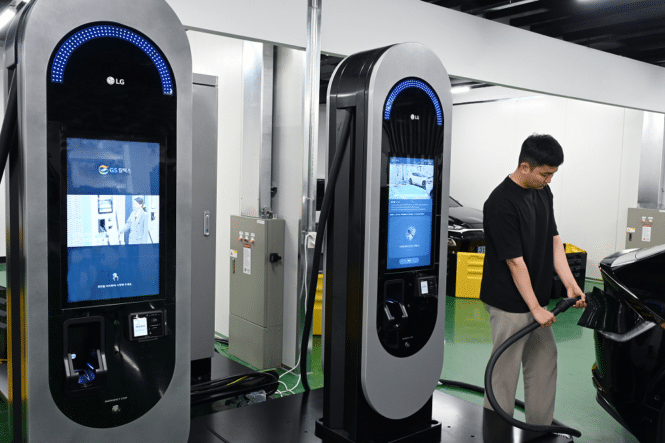
Ford and GM Announcement on Tesla NACS
Now we get to see how everything shakes out. With Ford and GM announcing support for Tesla charging connector standard, will that be enough for Tesla to “corner the market”? By contrast it is somewhat similar to Dell and Lenovo suddenly announcing they will focus on Apple IoS systems. In any case federal subsidies are in play and the Biden administration favors the CCS open standard. They did modify their Tesla support conditions that as long as CCS connectors provided, then Tesla charging stations will be eligible for federal funding. Shades of Betamax and VHS all over.
CharIN Response: From June 12 (Reuters) – CharIN, the industry body promoting the Combined Charging System (CCS) standard to power electric vehicles, said on Monday Tesla’s (TSLA.O) charging model is not a standard yet and does not provide an open charging ecosystem for the industry.
CharIN said it will convene a task force with the goal of submitting NACS, which was formerly Tesla’s propriety, to the standardization process.
It added that an open standardization process will go through a peer review process and interested parties will be able to contribute to development of the standard.
Charging equipment makers Blink Charging (BLNK.O), ChargePoint (CHPT.N) and Tritium (DCFC.O) said they will offer NACS as a connector option along with CCS in their charger offerings.
EV Charger Companies:
June 12 (Reuters) – Electric vehicle charging companies are cautiously embracing Tesla’s (TSLA.O) charging technology as the main U.S. standard, mere days after Ford (F.N) and GM (GM.N) said they were adopting it, but questions remained about how any interoperability would work.
The rare agreements between Tesla Inc and each of the two U.S. automakers, who among them control more than 60% of the country’s EV market, is likely to give top billing to Tesla’s North American Charging Standard (NACS). Tesla shares rose 2.2% on Monday.
That puts companies, including ChargePoint (CHPT.N), EVgo Inc (EVGO.O) and Blink Charging Co (BLNK.O), in danger of losing out on customers if they offer only Combined Charging System (CCS), the rival standard that the Biden administration has favored.
Mixed Message From CharIN?
From TechCrunch – CharIN said Monday during the 36th Electric Vehicle and Symposium in Sacramento that while it “stands behind” CCS it also supports the “standardization” of NACS. CharIN isn’t giving an unabashed endorsement. It is, however, acknowledging that some of its members in North America are interested in adopting Tesla’s charging tech and said it will create a task force with the goal of submitting NACS to the standardization process.
For any technology to become a standard it must go through a due process in a standards development organization such as ISO, IEC, IEEE, SAE and ANSI, the organization noted in a press release.
The comments are a reversal from last week when CharIN said diverging from the CCS standard would hamper the global EV industry’s ability to thrive. It also cautioned, at the time, that the use of adapters, which GM and Ford will sell to give current EV owners access to the Tesla Supercharging network, could lead to poor handling and increased damage of charging equipment and potential safety issues.
Road And Track Makes Some Good Points
Tesla designs its charging stations as a single integrated system with its cars, whereas EV charging networks like Electrify America or EVgo buy their stations from third-party makers. In the early days, no one company could supply high volumes of stations, so Electrify America had to use stations from four separate vendors: ABB, BTC Power, Efacec, or Signet. (EA is now in the process of designing its own stations and slimming down its roster of suppliers; Efacec is already gone, due to unreliability and difficult of servicing.)
Tesla knows its cars, their owners, and the credit card the owner provided, so billing happens on the back end. But a charging network open to all EVs may have no idea who or what just plugged in. The network has to ensure the user has a valid method of payment, whether it’s free hours provided by the carmaker to EV buyers or the more customary driver’s credit card.
Which Cars Support EV and How Much Are They (at least in California)?
Nice being able to afford a Tesla but do your neighbors drive a Tesla or do they drive a Honda or Toyota? We liked this breakdown the other day.
New battery rules went into effect in April that lowered the credit of the Model 3 Standard Range Rear Wheel Drive and Long Range All-Wheel Drive to $3,750. Tesla last week on its website said that all versions of the Model 3 again qualify for the full credit. The government confirmed the change on its fueleconomy.gov website.
A Model 3 starts at $40,240 and the price may fall to $25,240 when the $7,500 federal tax credit and another $7,500 from the California tax rebate kick in, depending on income and other requirements. Toyota’s Camry is listed at $26,320 and higher.
The subsidy change, along with aggressive discounts, should help Tesla prop up sales of its mainstay Model 3, whose demand has been weighed down by a major revamp this year, economic uncertainty and increasing competition.
Companies Positioned to Profit
- Without a doubt that company looks to be Panasonic. They must be a bit giddy over the prospect of Ford and GM entering their foodchain. Next up Toyota, Honda and Hyundai…
More Posts